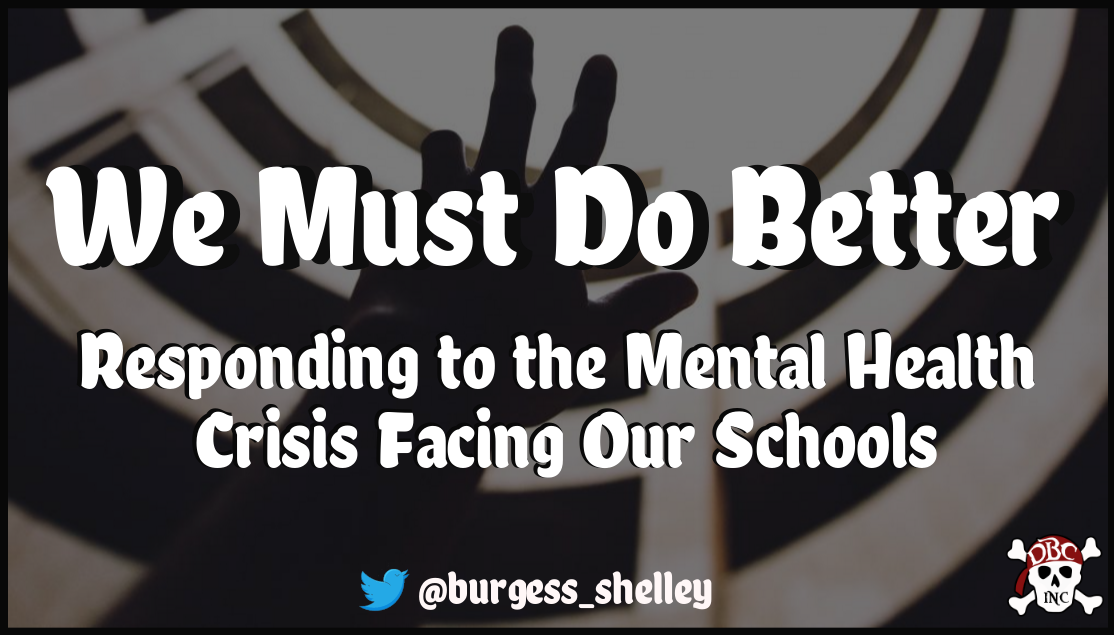
We Must Do Better
Responding to the Mental Health Crisis Facing our Schools
By: Shelley Burgess

Teenagers are moody. They can be hard to read, emotional, withdrawn, and difficult in so many ways. They don’t always want to talk to us – their parents, their teachers, and other adults in their lives. In the best of times parenting or teaching a teen can challenge us, frustrate us and make us question whether or not we are doing things right.
So it’s easy to miss the signs of mental illness that haunt one in five of our precious children. I know I missed them with our daughter. Dave missed them, too. So did her grandparents and all of her teachers. In fact when Ashlyn was in 8th grade, we would have told you she was having the best year of her life. Until it became abundantly clear that she wasn’t.
We were lucky, I think. Because Ashlyn had reached out to a friend, and that friend insisted she tell us what she was going through, what she was doing to herself, and what she was planning to do. Ashlyn did, and I am pretty confident that friend saved her life.
There had been no trauma, no bullying, nothing that we or she could point to that was making her so sad, making her feel like she was so alone or like she was a burden to everyone around her. None of us could logically explain the struggle she was having to simply stay alive.
But her mental illness explains it. Ashlyn was diagnosed with severe depression and anxiety disorder. She needed help that was beyond what we could do for her on our own. She needed our love, our understanding, our support. But she also needed her pediatrician, her psychiatrist, her therapist, and the right medication.
And she needed her teachers, her principal, her counselor and other members of the school community to be compassionate and responsive to her needs. And in her 8th grade year they were. Her teachers worked with us. They were loving, kind, supportive, and forgiving of things like absences, missing assignments and deadlines. And we are forever grateful.
I wish I could say our experience with the local high school was the same. We had all worked hard over the summer to try to manage Ashlyn’s depression, and when she started her freshman year, she went in strong. She was doing much better, feeling more confident, doing fine in school… until she wasn’t. Her depression is cyclical. She hit a low. It impacted everything in her life, including school. She was absent, she turned in work late or sometimes not at all, she failed several tests. The lack of support, the lack of empathy, the commitment to antiquated policies and practices was staggering.
If anyone knows how to fight the school system, Dave and I do, but we didn’t have the fight in us. And really we shouldn’t have to fight. No parent in any school should have to. We were fortunate to be able to move our daughter to another school that better meets her needs. She now works in an online environment at a school that operates on a mastery philosophy giving students multiple opportunities to demonstrate that they understand the content. Timelines and deadlines are flexible. She can miss school when she needs to with no penalties. The school isn’t perfect, but it works for her. And as a result, she has been able to live with her depression without her grades suffering, without the doors of college closing to her.
Not all kids have the option to change schools.
Not all kids have parents who know how to navigate the school system.
Not all kids have teachers or principals who understand mental illness and the impact it can have on a child’s school life.
We. Must. Do. Better.
On Saturday, during our weekly #LeadLAP chat. We talked about the mental health crisis facing our youth and what schools are (or should be doing) to support our children. What was evident from our chat is that this is a real issue for our schools. Teachers and administrators alike are looking for more support, more resources, more knowledge about how to help their students suffering from mental illness.
I hope you will take the time to read through the chat below.
I hope you will take time to learn more about mental illness and its impact on our children.
I hope you will work to help remove the stigma.
I hope you will keep the conversation going.
I hope you will take action.
All my best… Shelley
Part of the Like a PIRATE™ Blog Series
#LeadLAP Chat April 13, 2019
To access the incredible responses from our Lead Like a PIRATE chat on April, 13, scroll within the template below. Continue to scroll until you reach the responses to question 5.
[tcb-script src=”https://embed-assets.wakelet.com/wakelet-embed.js” charset=”UTF-8″][/tcb-script]